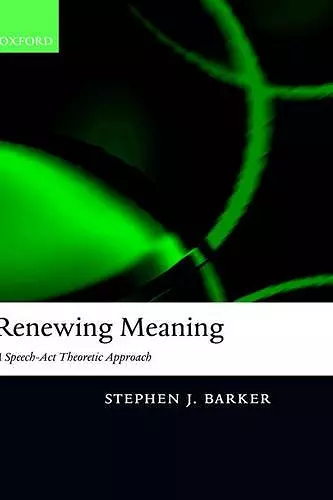Renewing Meaning
A Speech-Act Theoretic Approach
Format:Hardback
Publisher:Oxford University Press
Published:15th Apr '04
Currently unavailable, and unfortunately no date known when it will be back

At the birth of analytic philosophy Frege created a paradigm that is centrally important to how meaning has been understood in the twentieth century. Frege invented the now familiar distinctions of sense and force, of sense and reference, of concept and object. He introduced the conception of sentence meaning as residing in truth-conditions and argued that semantics is a normative enterprise distinct from psychology. Most importantly, he created modern quantification theory, engendering the idea that the syntactic and semantic forms of modern logic underpin the meanings of natural-language sentences. Stephen Barker undertakes to overthrow Frege's paradigm, rejecting all the above-mentioned features. The framework he offers is a speech-act-based approach to meaning in which semantics is entirely subsumed by pragmatics. In this framework: meaning resides in syntax and pragmatics; sentence-meanings are not propositions but speech-act types; word-meanings are not objects, functions, or properties, but again speech-act types; pragmatic phenomena one would expect not to figure in semantics, such as pretence, enter into the logical form of sentences; a compositional semantics is provided by showing how speech-act types combine together to form complex speech-act types; the syntactic structures invoked are not those of quantifiers, open sentences, variables, variable-binding, etc., rather they are structures specific to speech-act forms, which link logical form and surface grammar very closely. According to Barker, a natural language - a system of thought - is an emergent entity that arises from the combination of simple intentional structures, and certain non-representational cognitive states. It is embedded in, and part of, a world devoid of normative facts qua extra-linguistic entities. The world, in which the system is embedded, is a totality of particular states of affairs. There is no logical complexity in re; it contains mereological complexity only. Some truths have truth-makers, but others, logically complex truths, lack them. Nevertheless, the truth-predicate is univocal in meaning. Renewing Meaning is a radical, ambitious work which offers to transform the semantics of natural language.
This book is a stalwart attempt to renew meaning understood in terms of speech-acts. It is a sweeping effort, addressing metaphysics and epistemology, philosophy of action and philosophy of mind, and of course, semantics and pragmatics. While I suspect that fans of the more traditional, proposition-based approach to semantics will find much to complain about in this book, it nevertheless represents a significant step forward for speech-act theory and, in my view, for semantics as a whole. . . . This challenging book renews my faith in the possibility of a workable speech-act semantics, one that takes intention and action as its starting points and does justice to the complexity of natural language. . . . this is an outstanding book, one that represents more than a decade of careful reflection on * Michael ORourke, Notre Dame Philosophical Reviews *
continued............. the details of semantic theory. While I doubt many in the orthodox community will be moved to convert, they will certainly be moved to reflect, and that is about all you can ask from a book as contrary as this one. It may not renew meaning, but it should renew interest in speech act theory. I hope that Renewing Meaning receives the attention it deserves--semantics would be the better for it. * Michael ORourke, Notre Dame Philosophical Reviews *
ISBN: 9780199263660
Dimensions: 242mm x 163mm x 25mm
Weight: 663g
338 pages